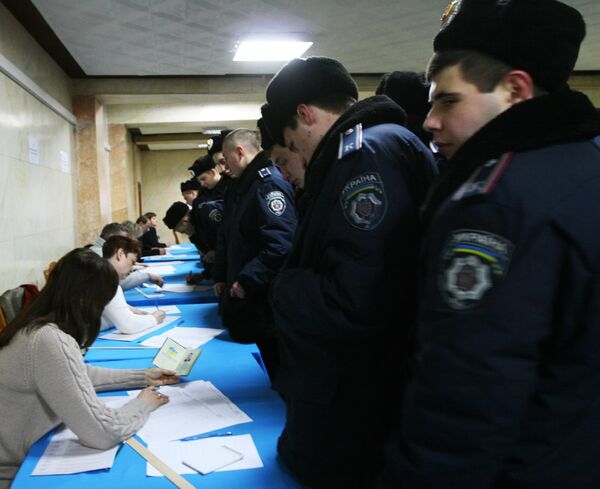It's incredible, but this time, the presidential elections in Ukraine were uncharacteristically peaceful and even humdrum. The first round, in any case. The only "ripple" in this ocean of calm was the arrival of 400 Georgian "journalists" with a soldierly appearance. As for the rest, observers did not identify any serious violations and from the point of view of fairness and observance of democratic norms, the first round left nobody with any doubts. Therefore, it is fully possible to review the initial results.
A second round is unavoidable, but Viktor Yanukovych has a 10% lead over his main opponent Yulia Tymoshenko. Viktor Yushchenko set a world record for the most "non-reelected" acting president, garnering only a little over 5% of the vote. One should know how to "bow out gracefully."
Another one of Yanukovych's achievements in this election is that in addition to being the core candidate of the eastern Ukrainian electorate, he turned out to be the winner for the first time in Ukraine's westernmost Transcarpathian region. Moreover, the relatively high voter turnout - 67% - showed that most Ukrainians associate themselves with their country and are not indifferent about its destiny.
Renowned political scientists and sociologists in Russia and Ukraine met via a live video link to discuss the outcome of the elections.
Most of the participants were in agreement in giving their forecasts for the subsequent development of the situation in Ukraine. The approximate scenario is the following - Yanukovych will win the second round by a narrow margin, since, first, his solid lead in the first round is impossible to ignore.
Second, it is highly unlikely that Serhiy Tyhypko or Arseny Yatsenyuk will support any of the candidates since this will effectively end their political careers.
Third, as noted by Konstantin Zatulin, director of the Institute of the CIS Countries, "Yanukovych certainly has tremendous unrealized potential. Yanukovych's turnout and vote count are considerable, but they are not as considerable as they were in 2004 in such Russian-speaking regions as the Crimea and Sevastopol. This is a consequence, among other things, of the mistakes of the regional divisions of the Party of Regions. And of course, Yanukovych has it within him to correct these mistakes and gain the additional votes needed on account of his core electorate."
Regarding possible tandems, Tyhypko and Yatsenyuk, as new political figures, basically, have no loyal, established voters so far. Vladimir Kornilov, director of the Ukrainian branch of the Institute of the CIS Countries, holds that the only candidate with an established electorate is Pyotr Simonenko, who had 3.95% of the vote. In the second round, his support could mean a lot more than that of Tyhypko and Yatsenyuk.
The likelihood of a Tymoshenko-Tyhypko tandem, in exchange for the prime minister's seat for the latter, is not great. Let's bear in mind that, according to the Ukrainian constitution, the prime minister can take office only with the approval of the Verkhovna Rada.
Therefore, it can be deduced that an "automatic" transfer of the votes of candidates that did not make it into the second round is not a given. At the same time, few political scientists can imagine that such a purposeful political figure as Yulia Tymoshenko would just surrender while so close to victory. If she is defeated, she is expected to either contest the election results or resort to other, more radical measures. In any case, it is obvious that the second round is "winner takes all," and that each candidate will not be shy about using every means at his or her disposal.
"In 2004, Ms. Tymoshenko refused to concede and she won. In 2007, Ms. Tymoshenko refused to recognize the results of the parliamentary majority vote and she won. Why a person that has refused to concede and won twice would refuse to do this a third time, I honestly don't know," said Russian State Duma Deputy Sergei Markov.
However, there is no danger of another "orange-like scenario." The West's interest in Ukraine is at least ostensibly more guarded. This can even be measured by the degree of coverage of the Ukrainian elections in the western press.
"Five years ago, outside factors played a key role," political scientist Vladimir Ryzhkov said. "Not from the point of view of intervention, but from the point of view of recognition. Today, there are no proponents for the destabilization of Ukraine. Everyone wants the second round to end in a victory for one of the candidates and that will be satisfactory."
The second round of the elections, which is scheduled for February 7, will show whether the experts were right. On the whole, most pundits agree that Yanukovych will win by a narrow margin. But there is no point in believing that victory will be automatic for the one with the electoral majority. Tymoshenko is not the kind of person who knows how to surrender, and for Yanukovych these elections are the last chance to justify all of the efforts and funds expended on him. The fight between Yanukovych and Tymoshenko is not over.
MOSCOW. (RIA Novosti correspondent Dmitry Romanovsky)
The opinions expressed in this article are the author's and do not necessarily represent those of RIA Novosti.



